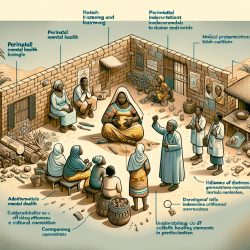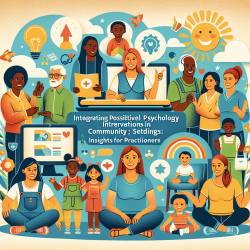Understanding Dusukasi: Insights for Practitioners from Rural Mali
In the realm of perinatal mental health, cultural context plays a pivotal role in how mental distress is expressed and understood. The research article "Dusukasi—The Heart That Cries: An Idiom of Mental Distress Among Perinatal Women in Rural Mali" provides valuable insights into the unique idioms of distress among perinatal women in Mali. This blog aims to help practitioners enhance their skills by understanding these cultural expressions and considering them in their therapeutic approaches.
The Context of Mental Distress in Rural Mali
In rural Mali, perinatal women face a myriad of challenges that contribute to mental distress, including poverty, gender inequality, and limited access to mental health resources. The study identifies several idioms of distress used by these women to express their mental health struggles. These idioms, such as gèlèya (difficulties), tôôrô (pain), hamin (worries), and dusukasi (crying heart), highlight the culturally specific ways in which distress is experienced and communicated.
Implementing Cultural Insights into Practice
For practitioners, understanding these idioms of distress is crucial for providing culturally sensitive care. Here are some ways to incorporate these insights into practice:
- Recognize Cultural Expressions: Be aware of the local idioms of distress and their meanings. This understanding can help in accurately identifying the mental health needs of perinatal women in Mali.
- Contextualize Interventions: Develop interventions that are culturally relevant and address the socio-economic factors contributing to distress. Consider involving community health workers who understand the local context.
- Enhance Communication: Use the local language and idioms to facilitate better communication and build trust with patients. This can lead to more effective therapeutic relationships and outcomes.
- Encourage Further Research: Practitioners should advocate for more research into the cultural aspects of mental health in different regions to develop a deeper understanding of local needs and effective interventions.
The Importance of Cultural Context
The study emphasizes the significance of cultural context in understanding and addressing mental health issues. In Mali, the expressions of distress are deeply rooted in the socio-cultural environment, making it essential for practitioners to consider these factors in their practice. By doing so, they can contribute to more effective mental health care and better outcomes for perinatal women.
For practitioners interested in further exploring this topic, the original research paper provides a comprehensive analysis of the cultural idioms of distress in rural Mali. To read the original research paper, please follow this link: Dusukasi—The Heart That Cries: An Idiom of Mental Distress Among Perinatal Women in Rural Mali.










